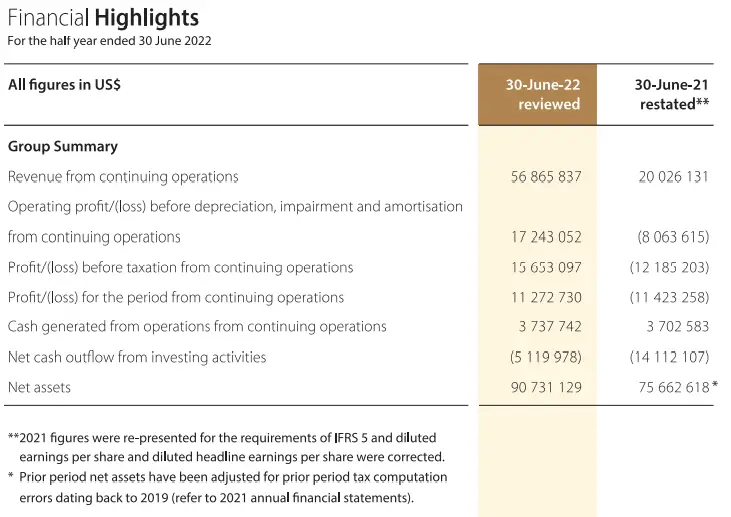Padenga Holdings Limited, the Zimbabwe-based crocodile breeding and gold mining company, is listed on the Zimbabwe Stock Exchange.
It has all the trappings needed to succeed in the tough economic environment that characterizes the southern African country. The crocodilian breeder and gold miner is a scion of the massive Innscor Africa Limited.
This company is a diversified conglomerate with a litany of moving parts. It has singlehandedly been responsible through equity carve-outs and spin-offs of its divisions for a lot of the new listings on the Zimbabwe Stock Exchange.
- Padenga Holdings Limited, which was spun out of Innscor, reported strong earnings, which saw the gold miner and crocodile breeder return to profitability.
- Gold prices which were elevated during much of the last financial year helped Padenga Holdings Limited’s financial performance.
- Padenga Holdings Limited was the first of diversified conglomerate Innscor’s subsidiaries to be spun off and listed on the Zimbabwe Stock Exchange. Other offshoots of Innscor include Simbisa Brands and Axia.
It spun off its fast foods business into a listed company called Simbisa Brands which has operations throughout Zimbabwe and in the region. Innscor’s automotive interests were also spun off into a listed outfit called Axia. Padenga Holdings, the subject matter, was one of the first entities within the Innscor stable to be spun off and listed first on the Zimbabwe Stock Exchange then subsequently on the US dollar-denominated bourse, the Victoria Falls Stock Exchange or VFEX.
Padenga Holdings Limited as stated earlier, has all that it takes to survive and thrive in the tough Zimbabwean economic environment. During the time it was in its former parent’s stable, the company now known as Padenga Holdings Limited was called Niloticus.
- Niloticus is what Padenga Holdings Limited was known as before it was unbundled from its parent company.
- The company’s crocodile breeding operation contributed less than 9% of the company’s revenues. The rest was contributed by Padenga Holdings Limited’s gold mining operations.
Its crocodile breeding business is a foreign exchange money spinner with almost all of its products, including skins and meat, destined for the export markets. Padenga Holdings Limited has arrangements with leading luxury goods brands in the world which it supplies with skins that are then transformed into luxury items like shoes, belts, and bags.
Not content to remain in the same line of business and seeing an opportunity in booming precious metals prices, Padenga Holdings Limited ventured into gold mining through the purchase of Dallaglio Investments and the Eureka gold mine in Guruve in Zimbabwe. Gold production and sales are explicitly and exclusively in foreign exchange, specifically United States dollars. Padenga Holdings produces both in droves gold and foreign exchange. Ideally, such a company should be a blue chip on the stock exchange, but it is not.
The term blue chip company was borrowed from roulette tables in casinos where chips are given to a gambler in the place of cash. Blue chips are the most valuable of the chips a gambler can have. Hence blue-chip companies are judged to be very valuable because of their inherently ability to generate consistently good earning earnings regardless of the economic environment.

Padenga Holdings Limited fits this description in letter and spirit. During the six months under review, the company achieved US$ 57 million in revenues, which was more than double what the company achieved the previous year. The company increased its revenues by 184% from US$ 20 million in 2021. The company’s mining operations contributed 91% of the revenues.
The crocodile operations contributed a negligible US$ 5 million to the top line. If this trend continues, supported by the elevated gold prices, it would not be unreasonable to surmise that Padenga will soon become a pure-play gold producer or even diversify into other precious metals.
The crocodile business could soon be a thing of the past since gold mining activities have largely eclipsed it. This is all speculation as the company has not made an official statement on the future strategic direction of the company.
The contribution by the mining business to revenue more than trebled in the six months under review. In June 2021, the gold mining business contributed US$ 15 million in revenues compared to the US$ 51 million it contributed during the period under review. In terms of production metrics, Padenga’s gold mining business sold a total of 933 kilograms of gold during the period under review compared to the 271 kilograms sold during the first 6 months of 2021. If the company continues this production trend, the company could very well produce and sell as many as 2 tonnes of gold.
- Padenga’s gold operations trebled their revenues in the first half of this financial year compared to the previous comparable period.
- Investors are speculating now when and not if Padenga will take the strategic decision to be a pure-play gold miner or diversify in the production of other precious metals. Innscor may look into purchasing an interest in the company.
This impressive top-line financial performance by Padenga translated into profit before taxation of US$ 15.7 million. What is even more gratifying for management and shareholders of the company is that Padenga’s performance for the last six months resulted in the company turning around a loss position of US$ 12 million during the previous comparable period to a profit position.
The company attributed its profit position to the incremental gold volumes delivered by its newly acquired Eureka mine, which came on stream during the period under review. The Eureka mine delivered 641 kilograms of gold which is more than half of what the company produced in the year. Not to be outdone, the crocodile operation also increased its productivity. Padenga sold 12,321 skins during the first half of its financial year, which is significantly higher than the 8,298 skins sold during the previous comparable period. The crocodile skins side of the business is not performing optimally, which would explain the company’s decision to diversify away from it into gold mining. The company announced that it benefitted from finding alternative markets for oversized prior year skins that did not meet premium customer requirements.
The company’s cash generated from operating activities was unchanged at US$ 3.7 million. The company attributed this to improved gold proceeds. With numbers like these under its belt, investors and stakeholders would be forgiven for thinking that the good times are rolling at Padenga Holdings Limited and that management and shareholders are cracking open champagne bottles to celebrate the windfalls of cash that the company is making hand over fist. This is not the case. At least not yet. Especially at Padenga Holdings Limited. The company prefaced its financial results by lamenting the real difficulties that companies experience operating in Zimbabwe. Padenga Holdings Limited specifically referenced inflation and volatile exchange rates.
In previous financial presentations, the company has expressed irritation at the monetary regime where companies are required by the authorities to surrender portions of up to 40% of their foreign exchange revenues to the central bank. The company said this undermined the viability of its business as a going concern. Padenga is not the only company that feels this way many others share the same feelings when it comes to the foreign exchange surrender requirements. While the company notes that it has returned to profitability, its focus remains to deleverage its balance sheet.
Doing so the company believes will create value for its shareholders. The company expects crocodile skins supply to high-end customers to remain firm and supported by firm prices. The gold price had started to soften during the period under review. This the company believes has been caused by rising interest rates and a strong United States dollar. The company has taken a cautious approach when it comes to cash. They have chosen to forego the dividend. This was not welcome news to long-suffering shareholders.











